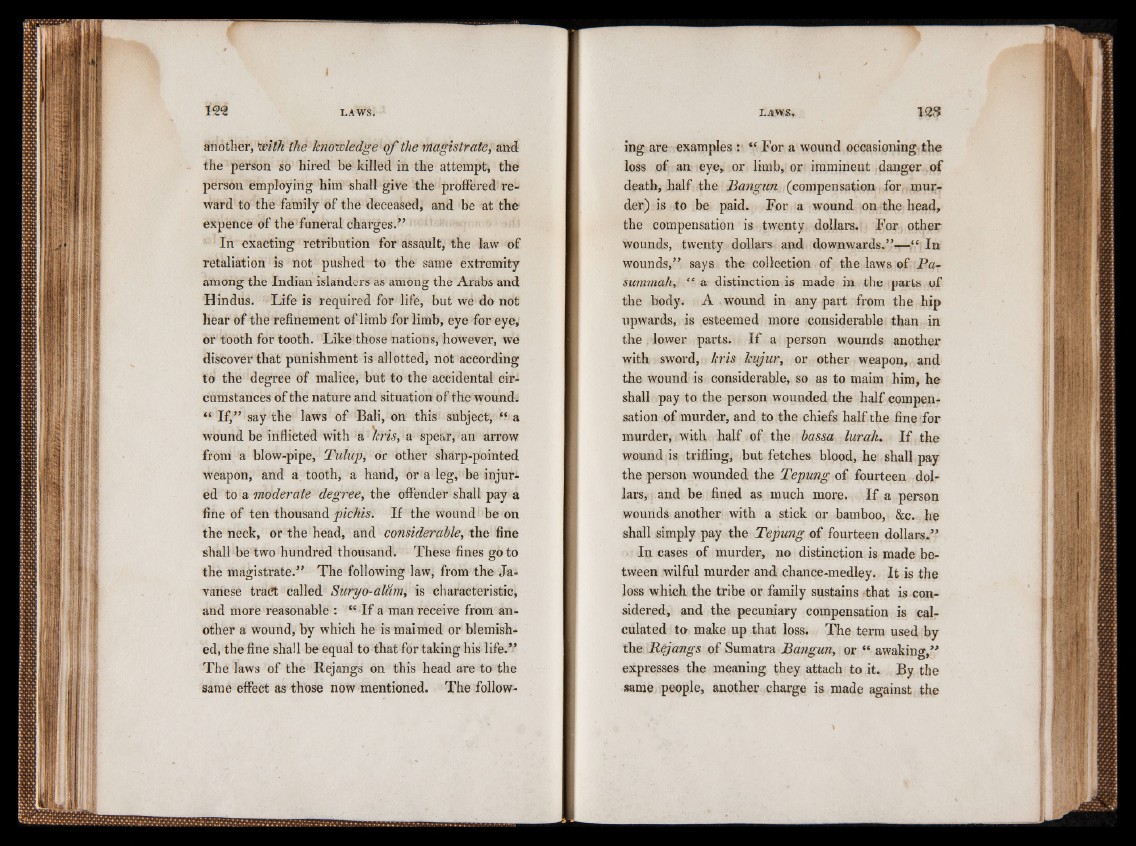
another, with the knowledge of the magistrate, and
the person so hired be killed in the attempt, the
person employing him shall give the proffered reward
to the family of the deceased, and be at the
expence of the funeral charges.”
In exacting retribution for assault, the law of
retaliation is not pushed to the same extremity
among the Indian islanders as among the Arabs and
Hindus. Life is required for life, but we do not
hear of the refinement of limb for limb, eye for eye,
or tooth for tooth. Like those nations, however, we
discover that punishment is allotted, not according
to the degree of malice, but to the accidental circumstances
of the nature and situation of the wound.
“ If,” say the laws of Bali, on this subject, “ a
wound be inflicted with a kris, a spear, an arrow
from a blow-pipe, Tulup, or other sharp-pointed
weapon, and a tooth, a hand, or a leg, be injured
to a moderate degree, the offender shall pay a
fine of ten thousand pichis. If the wound be on
the neck, or the head, and considerable, the fine
shall be two hundred thousand. These fines go to
the magistrate.” The following law, from the Javanese
traCt called Suryo-alam, is characteristic,
and more reasonable : “ If a man receive from another
a wound, by which he is maimed or blemished,
the fine shall be equal to that for taking his life.”
The laws of the Rejangs on this head are to the
same effect as those now mentioned. The following
are examples : “ For a wound occasioning the
loss of an eye, or limb, or imminent danger of
death, half the Bangun (compensation for murder)
is to be paid. For a wound on the bead,
the compensation is twenty dollars. For other
wounds, twenty dollars and downwards.”—“ In
wounds,” says the collection of the laws of Pa-
summah, “ a distinction is made in the parts of
the body. A wound in any part from the hip
upwards, is esteemed more considerable than in
the lower parts. If a person wounds another
with sword, kris kujur, or other weapon, and
the wound is considerable, so as to maim him, he
shall pay to the person wounded the half compensation
of murder, and to the chiefs half the fine for
murder, with half of the bassa lurah. If the
wound is trifling, but fetches blood, he shall pay
the person wounded the Tepung of fourteen dollars,
and be fined as much more. If a person
wounds another with a stick or bamboo, &c. he
shall simply pay the Tepung of fourteen dollars.”
In cases of murder, no distinction is made between
wilful murder and chance-medley. It is the
loss which the tribe or family sustains -that is considered,
and the pecuniary compensation is calculated
to make up that loss. The term used by
the Rejangs of Sumatra Bangun, or “ awaking,”
expresses the meaning they attach to it. By the
same people, another charge is made against the